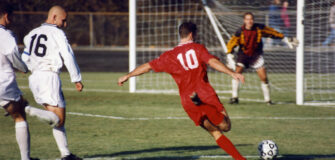NFL Tablets On The Sidelines
Share

One of the things that NFL coaches love to use in today’s NFL is using tablets on the sidelines for in-game strategies. Back in the day, you wouldn’t have any of this stuff, and you would have to adjust by using old-time papers and all that other stuff.
The NFL odds for Super Bowl LVII change weekly, and the playoff picture updates weekly. Why does having tablets on the sidelines potentially help in the NFL?
Players Can Watch Tape On the Sideline
When something goes right or wrong on a certain drive, quarterbacks love to watch what happens. Aaron Rodgers and Tom Brady are two notorious quarterbacks who have been shown on television watching stuff on tablets. The NFL doesn’t want the players to throw the device and potentially break it. The NFL has upgraded big time with these devices because all teams across the league try to use them to their advantage.
Watching tape on the sidelines is something quarterbacks couldn’t do even ten years ago. The game is faster and more advanced, and teams should be able to use it to their advantage. They can figure out what to do better on the next drive. Position coaches will need those tablets back from the players after the fact to make adjustments on the next drive.
Coaches Use Them In the Press Box
The offensive coordinators in the NFL often head into the press box to call plays. They feel they can see the field better when making these calls from the booth. They will have their tablets and their play sheets with them. They will use tablets to help call plays and see how the defense is aligned in a certain situation depending on the down and distance.
The offensive coordinator will then communicate what the play is the play in the quarterback’s helmet. For example, say the play is Z Slant Texas Orbit Trio Right (passing play). This is the play they want against another team’s 4-3 defense, and they are getting this. It would be good for them if they converted the play for a big gain. If they don’t convert, then it is simply bad execution.
The NFL lines are constantly changing throughout games. Technology is one of the reasons why.
Using Surface Pen
When on the sidelines, the coaches can go back to one particular play and draw something up about what happened and why it happened. If it was a third-and-6 and the quarterback gets sacked, and they are forced to punt, one of the coaches on the sideline can use the surface pen and draw up the arrows of what went wrong on that play.
Say the left tackle was supposed to block the defensive end, but he blocked the inside linebacker instead. For example, the coaches can point that out to him to ensure he is in the right spot the next time they get the same look or call the same play. They have a deal with Microsoft over the next few seasons, and hopefully, they can extend it so all of these teams have them moving forward.
Vegas NFL odds change during the hour, but it has nothing to do with what coaches do on the sidelines with the players using the surface pen.
Spotting Concussions
One of the main reasons the NFL is using Microsoft Tablets is to spot concussions at any point during the game. Because of this situation, there will be times when there is a medical timeout throughout the game. They want to make the game safer and care about player safety, which the NFL has sometimes struggled with.
Physicians and team trainers also have these on the sidelines. They can also bring up their medical records when necessary. With this technology, they should be spotting injuries and concussions more frequently.








